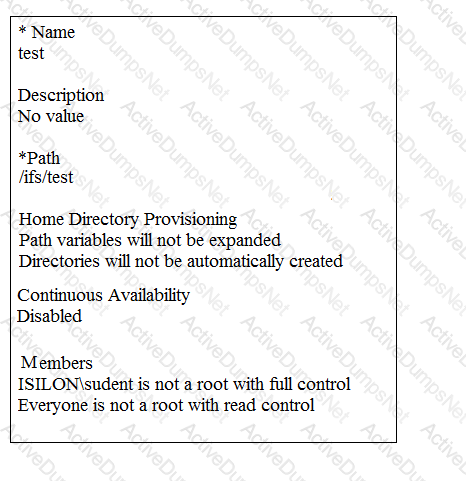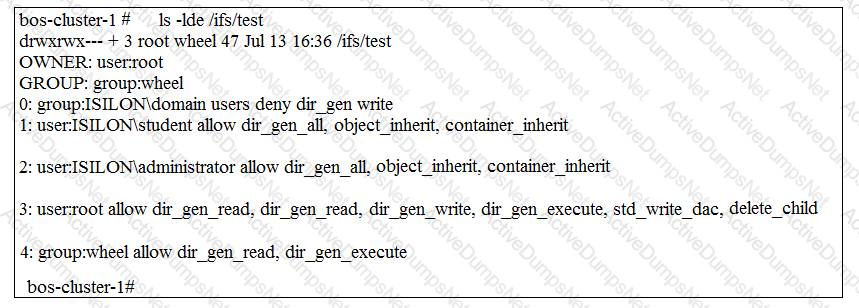EMC DEE-1421 Expert - Isilon Solutions Exam Exam Practice Test
Expert - Isilon Solutions Exam Questions and Answers
An administrator is investigating the performance of one of their Dell EMC Isilon clusters. Using the isi statistics drive command, the performance of the first five drives is shown.
Based on the exhibit, what represents the status of the drives?

A company uses a Dell EMC Isilon cluster to store greater than one billion files. The company often restores files from NDMP backups.
Which backup technology is recommended for the environment?
Case Study 3
A financial services company has file sharing workflows and 2000 home directories which include 70% Microsoft Windows and 30% Linux. The Security team is also interested in credit card usage data analytics such as point of sale, geolocation, and authorization and transaction data. Home directories and file shares do not require D@RE or SEC compliance.
However, due to the sensitivity of the credit card data, the company requires D@RE for credit card information and must adhere to the U.S. SEC 17a-4(f) compliance standards. Additionally, they are interested in auditing user access and anti-virus features.
The compute and storage environment consists of the following:
- 200 TB of Fibre Channel drives on NetApp ONTAP 7
- Environment is expected to grow 200 TB over the next three years
Which combined solution addresses the company’s requirement for D@RE and U.S.SEC 17a-4(f)?
Case Study 1
A company has several independent business units that operate globally. The company has consolidated its IT infrastructure services and operations. Common infrastructural services which include IPAM, DNS, NTP, DHCP, and SMTP have been consolidated. The company has complimented its infrastructure development by investing in Dell EMC Isilon clusters to host its user’s home and group directories and for compliance archival purposes required by individual business units.
The IT operations are located in India and the United States with its primary data center facilities co-located between New York and Texas. The company has a total of 60 AD forests:
- 1 main domain
- 55 domains have one-way trust relationships with the main domain
- An additional 4 domains do not have any trust relationship with no future plans of establishing trust relationships with the other domains.
Users of different AD domains use different FQDN to access their corresponding file services. Additionally, the company does not plan to consolidate the AD domains and each domain uses a different IP subnet. The users of the domains with no trust relationships have a compliance archival requirement. The company wants to all data to be replicated between New York and Texas.
What is the minimum number of groupnets required?
A company has an environment with multiple AD forests in a one-way trust relationship. The AD provider on the cluster is configured with SFU. The trusted domains are failing to supply UIDs and GIDs to the Dell EMC Isilon cluster. As a result, users from the trusted domain are receiving an “access denied” error message.
What is a possible reason for the denial?
A Dell EMC Isilon administrator has set up security on a share as shown in the exhibit. Users in the group entitled “domain users” should only be allowed read access to the share. Which user or group is able to only read from the share called “test”?


What enables CloudPools to achieve a recall of data from the cloud?
Case Study 1
A company has several independent business units that operate globally. The company has consolidated its IT infrastructure services and operations. Common infrastructural services which include IPAM, DNS, NTP, DHCP, and SMTP have been consolidated. The company has complimented its infrastructure development by investing in Dell EMC Isilon clusters to host its user’s home and group directories and for compliance archival purposes required by individual business units.
The IT operations are located in India and the United States with its primary data center facilities co-located between New York and Texas. The company has a total of 60 AD forests:
- 1 main domain
- 55 domains have one-way trust relationships with the main domain
- An additional 4 domains do not have any trust relationship with no future plans of establishing trust relationships with the other domains.
Users of different AD domains use different FQDN to access their corresponding file services. Additionally, the company does not plan to consolidate the AD domains and each domain uses a different IP subnet. The users of the domains with no trust relationships have a compliance archival requirement. The company wants to all data to be replicated between New York and Texas.
What is the minimum number of replication policies that are required to facilitate granular failover and failback capabilities for each AD domain?
